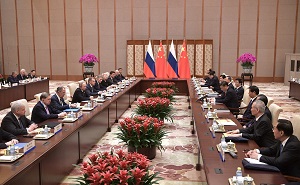
The Belt and Road Initiative, launched by China in 2013, comprising the Silk Road Economic Belt and the 21st Century Maritime Silk Road, is aimed at building a trade and infrastructure network along ancient trade routes connecting Asia with Europe, Africa and beyond.
The initiative has so far gained the support of more than 100 countries and international organizations. Building up on their cooperation initiated in 2016, UNECE and the National Development and Reform Commission (NDRC) of China are launching a comprehensive PPP capacity-building programme involving countries in the UNECE region.
The programme will consist of two elements:
- Capacity building for countries with a focus on specific people first PPP in a group of countries; and
- An international policy dialogue to discuss some of the policy issues – creating level playing fields in an open procurement - and some obstacles that may arise.
The heads of the two organizations, Mr. Christian Friis Bach, Executive Secretary of the UNECE, and Mr. He Lifeng, Head of the National Development Reform Commission, launched this project, formalized through a Memorandum of Understanding, at the Belt and Road Forum for International Cooperation (Beijing, May 14-15 2017).
Speaking on this occasion Mr. He said:
“The NDRC plans to promote the PPP funding model to support public infrastructure projects. The model will help lower the risks and provide sustainable funds to long-term projects”.
Mr. Bach declared:
“We are delighted to be cooperating with the Chinese National Development and Reform Commission to boost people first Public-Private Partnerships in support of the visionary Belt & Road initiative. With the success of the Belt & Road we will also make significant progress towards the UN Sustainable Development Goals.”
This cooperation will:
- Contribute to closing the infrastructure gap, a pre-requisite for achieving several of the Sustainable Development Goals;
- Develop transformational projects and quality infrastructure - a lead across a spectrum of different sectors such as transport, IT and social and environmental services;
- Promote inclusive development where disadvantaged and marginal groups can be supported, via, or example, roads connecting rural communities with global supply chains.
Specifically the cooperation will contribute to establishing more predictable enabling conditions and a sound PPP legal and regulatory framework. Experts will identify PPP projects. Experts will join an international network from public and private sectors,civil society and academia to support the programme. Furthermore, a roster of experts will be used for advice on the design and delivery of specific projects.
In addition, a PPP dialogue Mechanism will be created. This dialogue – open to all countries - will allow an exchange of views on how to remove barriers and obstacles to the development of projects in the UNECE region, thereby raising confidence and improving understanding. UNECE’s programme of developing international standards for people first PPPs will be a further focus of this dialogue and a tool to create a common language in such a discussion. A focusing at building confidence enhancing measures, removing barriers and developing standards.
Cross border PPPs are difficult to undertake and risky. For example, how to develop a cross rail project across five different countries involving probably five different sets of laws and acquisition policies. Without such coordination projects will inevitably face delay and may even stop the project going ahead in eh first place. These issues need to be addressed and there has to be a clear effort made by participating countries to improve standardization and harmonization of rules and procedures across all participating countries.
For more information, please contact Ms. Yu Jiangrong ([email protected] )

